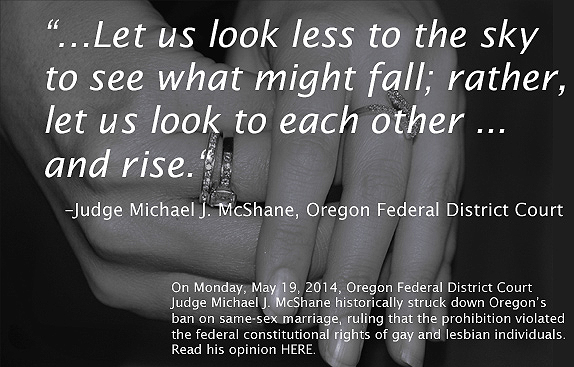Marriage Equality Comes to Oregon
This week, as Oregon celebrates 20 official years of Pride NW, our community has a lot to reflect on. For at least ten years, LGBT Oregonians have been mired in controversy over whether they could marry. In 2004, Multnomah County began issuing marriage licenses to same-sex couples, only to be ordered to stop issuing them in the ensuing court case. The Oregon Supreme Court ruled in 2005 that the 2004 marriages were invalid from their inception. In the meantime, voters approved Ballot Measure 36, which amended Oregon’s constitution to prohibit the contracting of same-sex marriages in the state, as well as the recognition of same-sex marriages celebrated elsewhere. And so it remained the law in Oregon for almost ten years.
In 2013, the United States Supreme Court decided the case of United States v. Windsor. Edith Windsor was a New York widow, married to Thea Spyer in Canada in 2007. After Thea’s death, Edith was forced to pay about $350,000 in estate taxes. If she had been married to a man, Edith would have had an exemption. However, the federal Defense of Marriage Act, which prohibited federal recognition of same-sex marriages, made that exemption unavailable to her. The Court held this discrimination by the federal government violated the liberty interest protected by the Fifth Amendment to the United States Constitution.
In an opinion by Justice Anthony Kennedy, the Court started by observing that DOMA was unique in the scope and extent of the federal regulation it imposed upon marriage, a legal relationship historically left largely to the states to regulate under our federal system of government. The law’s unusual character, the Court held, prompted a close examination to determine whether constitutional protections had been satisfied in its enactment.
Looking to the merits of the law, the Court found its purpose was to impose a disadvantage and a stigma upon those who enter into same-sex marriages. That purpose, the Court held, was improper under the Fifth Amendment’s guarantee of equal treatment under the law. “The federal statute is invalid, for no legitimate purpose overcomes the purpose and effect to disparage and injure those whom the State, by its marriage laws, sought to protect in personhood and dignity.”
The Windsor decision prompted a re-examination of Measure 36 at the state level in Oregon. First, Oregon’s Attorney General, Ellen Rosenblum, concluded Measure 36 could not constitutionally prevent Oregon from recognizing same-sex marriages celebrated elsewhere. She so advised the state Department of Administrative Services, which directed all state agencies to begin recognizing same-sex marriages from other states and countries. However, the state policy change affected only agency operations and not the courts, local governments, or private actors. Measure 36 remained the law in those respects, and continued to bar same-sex couples from actually marrying in Oregon.
Next, a federal court lawsuit was filed in Eugene and assigned to Judge Michael McShane. McShane is one of only a handful of openly LGBT judges in the entire federal system. The plaintiffs in the case, Geiger v. Kitzhaber, sought a declaration that Oregon’s marriage laws, including Measure 36, were invalid under the federal constitution because they denied the right of civil marriage to same-sex couples, and they sought an injunction prohibiting future enforcement of the marriage laws in that respect. On May 19, 2014, Judge McShane agreed the challenged laws violated the Equal Protection Clause of the Fourteenth Amendment and issued the requested injunction.
The court summarized the harmful effects of the state’s ban on same-sex marriage, holding that “[t]he laws frustrate[d] the plaintiffs’ freedom to structure a family life and plan for the future.” The state’s effort to ameliorate those harmful effects by adopting registered domestic partnerships as an alternative, the court observed, had been in many ways ineffective. The state’s marriage laws also prevented same-sex couples from accessing the many benefits accorded to married couples by the federal government. The laws “leave the plaintiffs and their families feeling degraded, humiliated, and stigmatized.”
The court observed that the state – as opposed to the federal – government had the right to define marriage, but that it must do so within constitutional limitations. A state’s marriage laws, thus, “must advance legitimate state interests, and not a mere desire to harm a particular class of citizens.” The court looked to the Windsor decision for the principle that a state’s marriage laws must not degrade or demean certain couples in violation of their right to equal protection.
Plaintiffs presented claims of both gender and sexual orientation discrimination, but the court concluded the claim of gender discrimination was not well founded. “The state’s marriage laws discriminate on the basis of sexual orientation, not gender.”
The court next examined each of the possible legislative rationales for excluding same-sex couples from marriage, and found them wanting. Tradition, the court held, could not be a legitimate government purpose. “Mere moral disapproval of a particular group of citizens is not a legitimate reason for intentionally withholding rights and benefits from that group.” The state’s interests in protecting children and promoting stable families, while legitimate, were disserved by the law and not supported by it. “Creating second-tier families does not advance the state’s strong interest in promoting and protecting all families.” Finally, “any governmental interest in responsible procreation is not advanced by denying marriage to gay and lesbian couples. There is no logical nexus between the interest and the exclusion. * * * The state’s interest is in a child’s well-being regardless of the means of conception.”
Since “no legitimate state purpose justifies the preclusion of gay and lesbian couples from civil marriage,” the court ruled in favor of the plaintiffs and enjoined the future enforcement of Oregon’s marriage laws to prohibit same-sex couples from marrying. The court’s order was effective immediately, and same-sex couples began marrying in Oregon that same day. The National Organization for Marriage has filed an appeal. It also sought a stay of McShane’s decision, which the Supreme Court denied on June 4, 2014.
So what does this all mean for the great state of Oregon? Following Judge McShane’s decision, Oregon LGBT couples are now confronted with many new and wonderful challenges – such as the decision of whether and when to marry. As in all cases, making a momentous decision like this should always be approached with careful planning. Celebrations aside, marriage does create a long-term, complex legal relationship between two people that is much easier to get into than it is to unravel. This is particularly true for LGBT couples who have already been together for many years, and may or may not have an existing domestic partnership. It’s important to plan carefully before entering into a new legal relationship as a new marriage may not reflect the way the couple has conducted its affairs in the past.
One of the key aspects of marriage is the protocol established by the legislature for divorce. That protocol provides, in general terms, for the division of the couple’s property between them and for their mutual support and maintenance after the dissolution. These provisions in the law can be modified by the parties in a premarital (formerly called a “prenuptial”) agreement. Same-sex couples considering marriage should confer with a lawyer to see whether a premarital agreement is appropriate to their circumstances.
Within the estate planning context, marriage affords a number of benefits that are not available to domestic partners. For starters, federal gift tax issues are implicated when making gifts in excess of the annual exemption (currently $14,000). Married couples are not subject to this limitation; they are allowed to make gifts to each other in an unlimited amount without gift tax consequences. This is significant, especially because gifts can take many forms. Consider the relatively simple act of adding another person’s name to the title of a shared asset (e.g., bank account, house or car). Married couples can do this without gift tax implications, but domestic partners who do so may be making taxable gifts.
Similarly, married individuals receive favorable treatment under federal estate tax laws. Under current law, the estate tax exemption is $5.34 million per person. To the extent an individual’s estate exceeds $5.34 million, a 40% tax will apply. This limitation does not apply to married couples, but it does to domestic partners.
Since 2010, federal estate tax law has allowed a married couple to share estate tax exemptions with each other. In effect, this process—known as “portability”—allows a married couple to transfer up to $10.68 million on the death of the second spouse without incurring any estate tax. Domestic partners are unable to elect portability and must utilize more sophisticated planning techniques to achieve the same result.
In Oregon, the act of marriage automatically revokes the married couple’s existing wills. Therefore, all couples, whether same-sex or opposite-sex, who are contemplating marriage should consider drafting a premarital agreement and review and update their estate plans with their attorney.
As the dust continues to settle, and new and complex cases emerge, we’ll learn more about the lasting effects of this decision, as well as the deeper impacts it will have on the great state of Oregon – both legally and financially. From a legal perspective, we should hope equalizing same-sex marriage will be a relief to our LGBT couples but most importantly, we hope they will consider their long-term financial and estate planning as they consider their decision to marry.
Read Oregon Federal District Court Judge Michael J. McShane’s full opinion HERE.
Written by: Mark Johnson Roberts , Of Counsel, Family Law. and John J. Christianson, Of Counsel, Estate Planning



